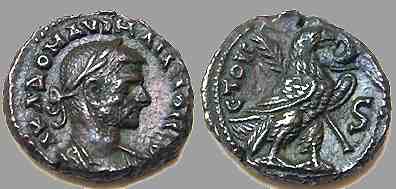Lucius Domitius Aurelianus
CommonName: Aurelian
Full Name: Lucius Domitius Aurelianus
Reign: 270-275 AD
Title: Emperor
Born: 207 AD
Died: 275 AD
Relationship: General of Gallienus
Lucius Domitius Aurelianus was from Lower Moesia,
and rose through the ranks to become an important cavalry commander under
Gallienus. After the latter's assassination, Claudius Gothicus appointed
him Master of the Horse. On the death of Claudius he was engaged in mopping
up the remnants of the Gothic raiders; then, proclaimed by the army, moved
against the Juthungi, who had invaded Italy. He defeated them with such
loss that they were happy to be allowed to get away. As Quintillus had
killed himself, the Senate had little choice but to acclaim him, although
it did so reluctantly.
For the next year Aurelian ranged to and fro battling
Germanic invaders. One group of them caught him in an ambush near Placentia;
his army was badly defeated, but the enemy broke up to plunder, so he was
able to defeat the plundering bands one by one. Meanwhile the mint-workers
in Rome, some of whom had been sacked for dishonesty, rose in revolt, and
it took some effort to deal with them. Nonetheless Aurelian, "Hand on Steel"
(Manu ad Ferrum), as he was called, cleaned up the west to the point where
he was ready to settle accounts with some of his neighbors.
The two neighbors which he had in mind were Gaul
and Palmyra. Both had declined somewhat from their original states. Tetricus
was a long way down from Postumus in terms of military skill; and whereas
Palmyra was still formidable, Odenathus had held Gallienus in great respect,
whereas his wife Zenobia, ruling through her son Vabalathus, had little
respect for Claudius or Aurelian. Of those Palmyra was the greater threat;
Tetricus was peaceful and non-expansionist. Accordingly Aurelian set out
for the east.
Palmyra had been slowly extending its influence
at Roman expense. Initially that city had been allied with Rome; then it
had become quasi-independent, issuing coins in the name of Vabalathus as
client under Aurelian, then finally in 271 Palmya threw off the mask, probably
on hearing news of Aurelian's defeat at Placentia.
Like many disastrous errors, it "seemed like a good
idea at the time". At first the Palmyrenes occupied Asia Minor and Egypt,
and expected to remain. Once Aurelian had recovered, however, he swept
through Asia like a brush-fire, and his general Probus occupied Egypt without
a fight. One town only, Tyana, offered resistance; Aurelian is said to
have sworn that he would not leave even a dog alive in the city. It was
betrayed on hope of pardon; the soldiers wanted to sack the town, and reminded
Aurelian of his words. To which he replied, "Then kill all the dogs". The
soldiers had a sense of humor; they took it in good spirit and the town
(and, presumably, the dogs) was spared.
Meanwhile Aurelian set out in pursuit of the main
Palmyrene army. The enemy army consisted largely of clibinarii, ancient
eastern predecessors of the European knights; Aurelian, however, used his
troops, both cavalry and infantry, with great skill, and even though outnumbered
he decisively defeated his enemy near Antioch, and then again near Emesa.
He used classical light cavalry tactics: his cavalry gave way before the
onslaught of the clibinarii, who soon tired; then Aurelian's cavalry swarmed
back all over them. The Palmyrenes retreated across ninety miles of desert
to Palmyra, where Aurelian's army followed; the Romans, however, worn out
by the journey, tried to make peace. They offered to let Zenobia surrender
on very moderate terms; she rejected them with contempt. It was her last
serious error; Aurelian rallied, brought the desert tribes under control,
defeated or discouraged the Persians who threatened to assist, the pressed
the siege. Zenobia tried to escape to Persia, but was captured.
Palmyra was generously treated; it was only garrisoned
by six hundred archers, but otherwise untouched. It rebelled the following
year, setting up a certain Antiochus as king; this time the Romans thoroughly
sacked Palmyra, and it sunk to village status where it remained.
After this Aurelian turned to Gaul. On his approach
Tetricus, supposedly because his soldiers were unreliable; more probably
because he had the sense to realize that he had no chance of winning, surrendered
to Aurelian. His army preferred to fight, but, outclassed as it was, went
down to defeat.
Aurelian celebrated a triumph in the grand Roman
manner, with the usual string of captives - including Zenobia and the Tetrici
- and captured equipment, wild animals and marvels of all sorts. He subsequently
reformed the coinage, which may not have been better silver, but at least
it was stabilized. He also introduced the new eastern cult of Sol Invictus,
the Unconquered Sun, as the new deity over the Roman pantheon; this was
the same sun-god brought by Elagabalus, but now in a Romanized version,
who appears on the coins as a chariot-driver with the orb, representing
the world, in his hand.
Aurelian claimed the titles of Restitutor Oriens
- restorer of the eastern world - and Restitutor Orbis, restorer of the
world. The Germans were quiet; the Persians did not dare stir; the breakaway
empires were back under Roman control; his claim was therefore well earned.
Unfortunately his iron discipline ultimately worked against him; he suspected
his secretary, named Eros, of some crime; Eros, in a panic, forged a punishment
order against some of Aurelian's subordinates. They, believing themselves
threatened, attacked and killed Aurelian.
Home
---------------------------------------------------------------------------------------------------------------------------------------------------------------------

Attractive Aurelian Tetradrachm, Alexandria,Year 6=274/5 AD, 6.89g,
Milne-4451, Rx: Eagle, aEF
